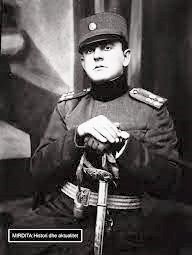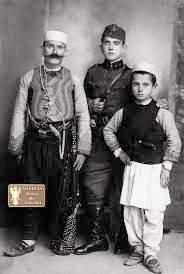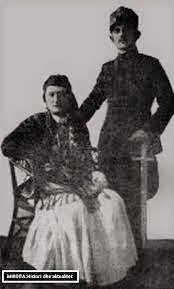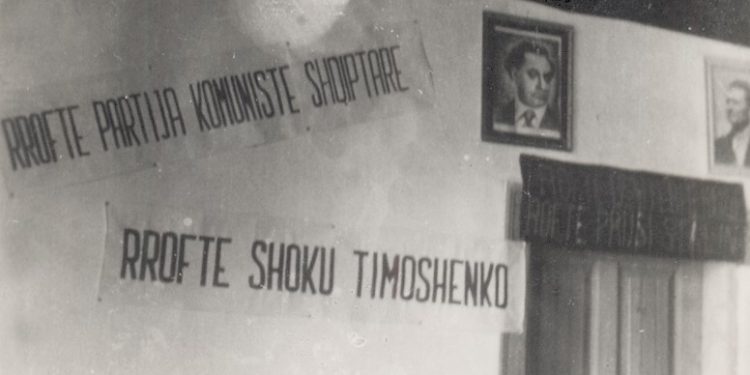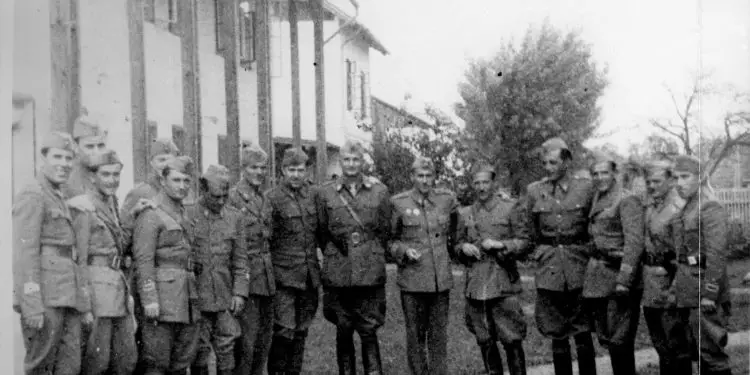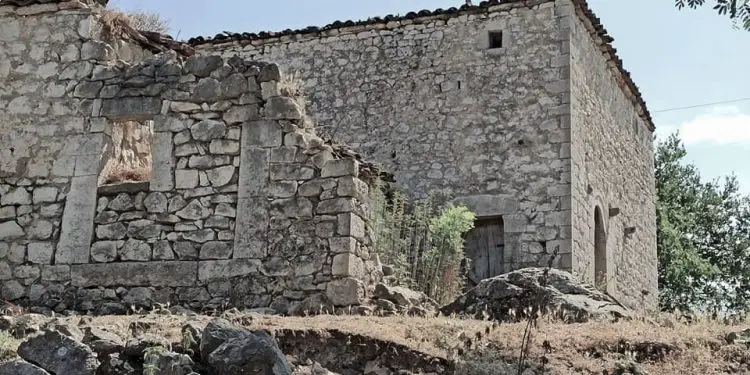From Ndue Dedaj
Memorie.al / The history of the war is not always what we have learned, it also has its own “stains” and crimes, which have never been talked about for half a century of monism. Moreover, human stories always rise above political ones. So also with the Slavic neighbors, no matter how many conflicts of different natures throughout history. They always take place away from political props, cameras and speeches. We spotted one already, but not the only one, and thought we’d bring it to the reader. Six years ago, together with Dr. Prengë Pepa, we knocked on the door of the well-known house “Fusha” in the village of Fang, just a few kilometers from Rubiku. We were welcomed by the owner of the house, Zef Fusha, over 75, who had taken a lot of trouble to bring from Visegrad to his homeland, the remains of his uncle, Frrok, who had been there since the beginning of 1945, while he was a partisan , had been executed by themselves and not by the enemy…!
How had it happened?
Frrok Zef Fusha, born in 1913, son of a well-known nationalist family in Bulgari, which is shown by the fact that he was among the few boys who completed his secondary education in the dormitory “Malet tona” in Shkodër and then studied at a military academy in Italy, probably in Modena, where he graduated as a genius. At that time, other well-known soldiers also graduated there, such as: Mark Arapi from Selita, Mark Doçi from Kthella, Shahin Toçi from Mati, etc.
Circumstances led Frroku and several other nationalist officers, towards the end of the Second World War, to be included in the 7th Assault Brigade, on the side of the partisans and their “alliance” and fight in Montenegro and Bosnia. for the liberation of Yugoslavia, after a common front of the Balkans was created, against the Nazi occupier, which is also related to the “liberation” of Kosovo. It was when Frroku was in Visegrad that his drama suddenly began, which unbelievably ends in tragedy.
Nothing is known exactly how the events unfolded that cold Bosnian winter, but Frroku, together with some other partisans, is accused by the command, that they were preparing to desert from the war?! A mystery that was never solved. He and another partisan are imprisoned in the basement of a house, tortured and shot, as war traitors. These were the words that had come from word of mouth, without knowing that someone, moreover, a character in those events, had taken note, as if to say that nothing remains forever in the ground.
Former partisan Nikollë Melyshi, father of the “People’s Hero”, Pal Melyshi, then escaped to America, in his memoirs written across the Atlantic, published in the newspaper “Panorama”, (in the file dated August 31, 2022), prepared by the journalist Afrim Imaj, illuminates that unusual event, about which the history of the war has been silent. He writes that at the beginning of November 1944, the partisan brigades took over the Subprefecture of St. Paul of Mirdita and the headquarters was established there, with all the senior superiors, such as: Tuk Jakova, Tahir Kadareja, Gjin Marku, etc.
I and some friends, who had been officers and had not had the opportunity to leave Albania, were escaping through the mountains. The Partisan headquarters in Shënpal gave us an official invitation to appear and surrender to Gjin Pjetër Marka Toma, who was the commander of the Seventh Brigade. So, we officers who received the news from him: me, Mark Doçi, Dod Bardhoku, Frrok Fusha and Ndue Preng Kol Gjonmarkaj, decided to surrender alone for the sake of the children and since we had no other option to save them. “The fact that you will also participate in the fight against the occupier will be a security for your life and stop hitting their families”, we were told.
“During the fighting, some men from Bregu i Mata, who were mobilized like us to attack the Germans through Montenegro, escaped. At this time, doubts also arose about our part. After this event, we were also arrested: me, Dod Bardhokun and Frok Fushë. The Commissioner of the Brigade, Qazim Kapisyzi, preceded us and tied us with our hands behind our backs, keeping us isolated in very difficult conditions. The Germans were drawn in by vehicles and their rearguards had a strong center in Visegrad, Bosnia. Mue and Dod Bardhokun were released, but near a town, Frok Fushën and a young man from Kthella e Epër, after they rotted in the wood, they were shot!
Two partisans were killed so suddenly, in cold blood, without any conscience by their communist bosses! You are impressed by the fact that; Frroku and the boy from Kthella were partisans and not political prisoners, but surprisingly, they are treated as such. Not even General Gjin Marku could escape them, who was a mirdita, like them and who had taken them in the War himself.
It is said that his letter was sent an hour after the execution had taken place, but this remains simply a legend, as long as it has not been found in the archives – this has also been said in other cases of executions in the war, perhaps the high command had not agreed, but the courier was late, etc., etc. The truth is that; “Partisan court”, to make a mess without law and without trial, as he did before, with Ramize Gjebrena in Vlora.
As in the cases of the death of political prisoners in the camps, Frroku’s family was not notified of his murder, far from Albanian territory, while the name of the other partisan was also lost. However, it had been said that the remains of the two executed should not be lost in foreign lands, due to the nobility of a Serbian man, who had buried the two Albanians on his land, next to an apple tree.
The village knew it was there; “Grave of Albanians”. People everywhere treat graves with respect, so even in that mountain village of Visegrad, that hard apple would remain the only monument of their memory.
“There, at the apple tree, was the grave of two Albanians”, they would say whenever someone could go there to take the remains. The owner of the house had planted another apple tree there, so that if the old one dried up, the new one would continue to be a witness. And, only thanks to her, after 70 years, word after word, asking Montenegrins and Serbs, he reached that double grave of Albanians, who in other circumstances would have been heroes…!
Visegrad was already abandoned. That “Albanian” apple house was closed and its owner had died, but his son lived, who lived in Sarajevo. He said to those who had gone to collect the remains: “My father left me a bequest; he told me that the grave is at the end of the field, in the shadow of the apple…”! It was the only one from the Balkans, which did not even dissolve the soil. It was for him that the dead rose from the grave. “We went to Visegrad twice,” Zefi confessed, “the first time we met a 92-year-old old man and asked him.
I will not forget especially one day in September 2014, when while it was raining, we climbed the mountains of Visegrad. The mountain was full of apples. You see abandoned alpine houses everywhere. We were received very well. Their customs were just like ours, to bring coffee with a glass of brandy. They had maintained the tomb.
We feel indebted to that Serbian family”. Time moves on, but its signs remain. Especially the graves. The “Graves of the Albanians” there reminds you of the “Graves of the Serbs” here, with a difference that they had come here as conquerors, while the Albanians had marched there as liberators.
The unfortunate partisan Frrok Fusha had left the Bird Bridge in his hometown and found the Bridge over the Drin, which would enter as an imperial epic in Ivo Andrić’s novel. One with the arches from above, the other from below. One several centuries old, the other younger than him in age. One named Pasha, the other named King. His memory wandered between these two bridges, Albania and Bosnia, Bulgari and Visegrad.
Once upon a time, it was customary for warriors who died in distant wars, whose remains could not be brought, to be erected in their homeland in what were called dedication graves. This is what happened to the Mirditas, who were killed on the banks of the Danube during the Russo-Turkish war of 1877-1878. Whereas Frroku, a partisan, would not even have one in his hometown, until 2015, when this was made possible by his family members.
The Fusha family was in the spotlight in Bulgaria and throughout Mirdita. Zefi, Frroku’s father, comes through a photograph taken in Shkodër in 1922, by Kel Marubi. A man mentioned for his wisdom, who knew not only the customs of the country, the stories of the bajrak, but also the watering days of each family in the village, like a living “calendar”. He had two other sons besides Frrok. Nikola had studied Law in Turin and in 1944; he was finishing his studies, while Lleshi took care of the household.
Gjon Fusha, the priest of Frroku, was a soldier, he had studied in Shkodër and knew German, for which the Austrians once hired him as a translator. The well-known nationalist Fusha family, who were also friends with Gjomarkaj, was politically attacked after the war, for collaborating with the “Mountains Committee”, an anti-communist organization, etc. In September 1944, the assembly of the most prominent nationalist leaders of the country was held in the Fushajje tower, which may have indirectly influenced the fate of Frrok.
Therefore, the house was raided several times after the war by the State Security, discarding documents, family relics, etc. There were also Frrok’s notebooks full of notes from when he was a student in Italy.
Frroku and his wife, Mara, daughter of the Pepa family in Paraspuer, had no children. After her husband’s murder, she stayed with her brother-in-law and nephew, Zefin, who inherited his grandfather’s name. Once, when those of the Pursuit Forces wanted to set fire to the house, she had shouted: “No! You won’t burn it. I had the partisan man, he was killed! The house is mine…”! With this word they were tamed and the house was saved, without being set on fire.
Mother Mara, she was very close to her heart, especially the children, the people of the house where she was born called her Burrnesha; “Father Ruta”. She had close relations with the women of the tribe, since most of their husbands were in prison and exile. She herself had been in exile for three months. It was a kind of solidarity of women, of politically affected families. Her brother, Ndue Pepe, who had served during the war, in the state administration in Gjilan, had been put in political prison.
Such noble women, who suffered from serious family events, returned to the pillar of the house, alongside their husbands. They felt doubly responsible for their father’s house and the one where they were married. Mother Mara (Ruta) was also a mentioned mourner of that side. But, as those who knew her say, a novel would not be enough for her biography.
The singer Mrikë Trumshi, who became famous at the Gjirokastra National Folk Festival in 1978, with Mic Sokol’s song, writes: “I remember Mother Mara, at an advanced age in my native village, Fang. She was a lady, a model of intelligence and nobility among village women. She immediately stood out because she was very special, like some movie actress with masculine features in her portrait. Age had slightly bent her high stature, but not the character of the persecution of the family”. “Like Mara and Frrok Zefit in the meal”, was an appreciative expression of the grandmother…
EPILOGUE
That apple of Visegrad, which guarded the grave of two Albanian partisans from 1945 to today, surpasses any metaphor. It would be wise to discover as many such “apples” of history between people of different ethnicities in such times of integration, as then we would understand more clearly the political initiatives of this time, such as the “Open Balkans”. “, etc. Memorie.al




